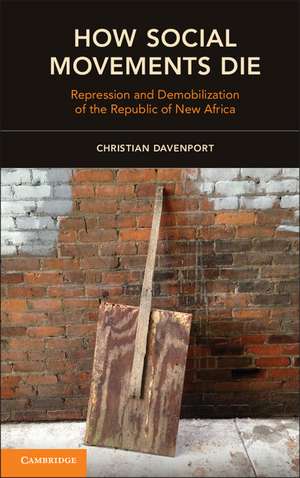How Social Movements Die: Repression and Demobilization of the Republic of New Africa: Cambridge Studies in Contentious Politics
Autor Christian Davenporten Limba Engleză Paperback – 21 dec 2014
| Toate formatele și edițiile | Preț | Express |
|---|---|---|
| Paperback (1) | 240.63 lei 6-8 săpt. | |
| Cambridge University Press – 21 dec 2014 | 240.63 lei 6-8 săpt. | |
| Hardback (1) | 485.51 lei 6-8 săpt. | |
| Cambridge University Press – 21 dec 2014 | 485.51 lei 6-8 săpt. |
Din seria Cambridge Studies in Contentious Politics
-
 Preț: 251.27 lei
Preț: 251.27 lei -
 Preț: 220.86 lei
Preț: 220.86 lei -
 Preț: 203.50 lei
Preț: 203.50 lei -
 Preț: 238.15 lei
Preț: 238.15 lei - 9%
 Preț: 626.76 lei
Preț: 626.76 lei -
 Preț: 162.90 lei
Preț: 162.90 lei -
 Preț: 210.37 lei
Preț: 210.37 lei -
 Preț: 160.00 lei
Preț: 160.00 lei -
 Preț: 178.72 lei
Preț: 178.72 lei -
 Preț: 289.11 lei
Preț: 289.11 lei -
 Preț: 197.42 lei
Preț: 197.42 lei -
 Preț: 231.38 lei
Preț: 231.38 lei -
 Preț: 263.79 lei
Preț: 263.79 lei -
 Preț: 274.27 lei
Preț: 274.27 lei -
 Preț: 227.61 lei
Preț: 227.61 lei - 11%
 Preț: 637.54 lei
Preț: 637.54 lei -
 Preț: 474.87 lei
Preț: 474.87 lei -
 Preț: 225.50 lei
Preț: 225.50 lei -
 Preț: 269.58 lei
Preț: 269.58 lei -
 Preț: 201.59 lei
Preț: 201.59 lei -
 Preț: 229.56 lei
Preț: 229.56 lei -
 Preț: 238.13 lei
Preț: 238.13 lei -
 Preț: 306.73 lei
Preț: 306.73 lei - 11%
 Preț: 553.62 lei
Preț: 553.62 lei - 11%
 Preț: 694.04 lei
Preț: 694.04 lei -
 Preț: 231.05 lei
Preț: 231.05 lei -
 Preț: 305.33 lei
Preț: 305.33 lei -
 Preț: 201.59 lei
Preț: 201.59 lei -
 Preț: 230.51 lei
Preț: 230.51 lei - 14%
 Preț: 791.97 lei
Preț: 791.97 lei - 11%
 Preț: 555.03 lei
Preț: 555.03 lei -
 Preț: 251.27 lei
Preț: 251.27 lei -
 Preț: 251.27 lei
Preț: 251.27 lei - 11%
 Preț: 459.73 lei
Preț: 459.73 lei -
 Preț: 267.08 lei
Preț: 267.08 lei
Preț: 240.63 lei
Nou
Puncte Express: 361
Preț estimativ în valută:
46.06€ • 50.05$ • 38.71£
46.06€ • 50.05$ • 38.71£
Carte tipărită la comandă
Livrare economică 21 aprilie-05 mai
Preluare comenzi: 021 569.72.76
Specificații
ISBN-13: 9781107613874
ISBN-10: 1107613876
Pagini: 352
Ilustrații: 27 b/w illus. 2 tables
Dimensiuni: 153 x 230 x 20 mm
Greutate: 0.5 kg
Editura: Cambridge University Press
Colecția Cambridge University Press
Seria Cambridge Studies in Contentious Politics
Locul publicării:New York, United States
ISBN-10: 1107613876
Pagini: 352
Ilustrații: 27 b/w illus. 2 tables
Dimensiuni: 153 x 230 x 20 mm
Greutate: 0.5 kg
Editura: Cambridge University Press
Colecția Cambridge University Press
Seria Cambridge Studies in Contentious Politics
Locul publicării:New York, United States
Cuprins
Introduction; Part I. Theory: 1. Killing social movements from the outside or the inside; 2. Killing social movements from the outside and the inside; Part II. Case: 3. Repression and red squads; 4. Record keeping and data collection; Part III. Origins: 5. We shall overcome?: From GOAL to the Freedom Now Party; 6. We shall overthrow!: from the Malcolm X Society to the Republic of New Africa; Part IV. Examination: 7. Birth of a black nation; 8. To Ocean Hill–Brownsville and b(l)ack; 9. New Bethel and the end of the beginning; 10. When separatists separate; 11. Mississippi: the last stand(off); Part V. Conclusion: 12. Understanding the death of social movement organizations.
Recenzii
'Marshalling insightful analysis, brilliant archival research, and extensive knowledge, Davenport explains the emergence, growth, and demise of social movements. This book is a real gem.' Scott Gates, Peace Research Institute Oslo and Norwegian University of Science and Technology
'Through a meticulous analysis of a single case - the Republic of New Africa - Christian Davenport presents us with new theoretical insights into the external forces and internal dynamics that can eventually lead to the demise of a social movement organization that at its inception was at the forefront of a broader movement. His analysis of archival information on both overt and covert forms of state repression as well as his scrupulous analysis of RNA internal documents present us with innovative methods and novel lessons for the study of how social movement organizations emerge and eventually die.' T. David Mason, University of North Texas
'Through a fascinating case study of the Republic of New Africa, Christian Davenport brings his expertise on political repression to bear on a question that has, oddly, been largely neglected by scholars: how and why do social movements die? Drawing on unusually rich data that take us inside the thought processes of movement actors as well as their opponents, Davenport offers deep insight into both the rise and demise of social movement organizations.' Rory McVeigh, University of Notre Dame
'There is a great deal to admire about this book from its astonishingly rich data and thorough analysis to its clear theorizing about an important and nettlesome issue in the study of repression (What are the consequences of repression?) to its call for research on demobilization.' American Journal of Sociology
'… the book will be useful for scholars interested in demobilization of social movement organizations or the general impact of state repression on movements, organizations, and individuals.' Ahsan Kamal, Oxford University Press Journals: Social Forces
'Through a meticulous analysis of a single case - the Republic of New Africa - Christian Davenport presents us with new theoretical insights into the external forces and internal dynamics that can eventually lead to the demise of a social movement organization that at its inception was at the forefront of a broader movement. His analysis of archival information on both overt and covert forms of state repression as well as his scrupulous analysis of RNA internal documents present us with innovative methods and novel lessons for the study of how social movement organizations emerge and eventually die.' T. David Mason, University of North Texas
'Through a fascinating case study of the Republic of New Africa, Christian Davenport brings his expertise on political repression to bear on a question that has, oddly, been largely neglected by scholars: how and why do social movements die? Drawing on unusually rich data that take us inside the thought processes of movement actors as well as their opponents, Davenport offers deep insight into both the rise and demise of social movement organizations.' Rory McVeigh, University of Notre Dame
'There is a great deal to admire about this book from its astonishingly rich data and thorough analysis to its clear theorizing about an important and nettlesome issue in the study of repression (What are the consequences of repression?) to its call for research on demobilization.' American Journal of Sociology
'… the book will be useful for scholars interested in demobilization of social movement organizations or the general impact of state repression on movements, organizations, and individuals.' Ahsan Kamal, Oxford University Press Journals: Social Forces
Notă biografică
Descriere
This book argues that social movement death is the outgrowth of a coevolutionary dynamic.












